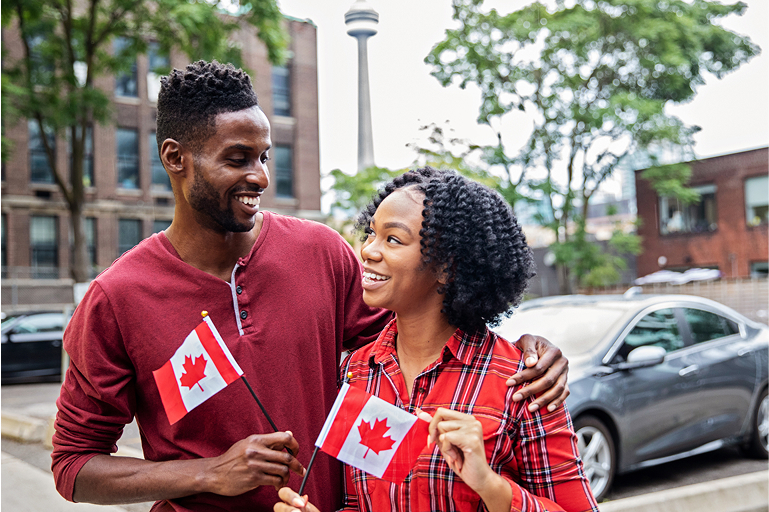
Canada is one of the most popular study-abroad destinations for international students, offering a world-class education system, a safe environment, and a welcoming, diverse culture. However, all newcomers will benefit from Canadian advice on adjusting and assimilating to a new country. Yes, living in Canada comes with challenges, and understanding Canadian culture will help you feel at home faster.
This guide will provide everything international students should know about Canada, from cultural norms and social etiquette to major holidays, traditions, and local customs. Learn practical tips for adjusting to life in Canada and how ILAC supports students studying in Canada beyond the classroom.
| Navigating Canadian Culture: A Guide for International Students |
Why Understanding Canadian Culture Is Important
Moving to a new country means navigating different customs, traditions, and ways of life. Even though Canada is known to be one of the friendliest and most multicultural places globally, adjusting to new surroundings can take time.
Like any nation, Canada’s history isn’t perfect. But it’s also a proud, flourishing country shaped by people from around the world. Many significant experiences, events and histories were once overlooked, but Canadians continue to work together to acknowledge the past, amplify diverse voices, and build a more inclusive future. You can be part of that, too!
By learning about Canadian culture, international students can:
- Feel more confident in social settings: Gain the confidence you need to socialize and connect with others
- Build friendships with local and international students: Build a network of friends you can all rely on for support
- Avoid cultural misunderstandings: Approach everyone with cultural sensitivity and respect for fruitful relationships
- Fully embrace the Canadian experience: Be a true local and gain a uniquely Canadian experience!
Whether studying in Toronto, Vancouver, or another Canadian city, understanding the country’s cultural landscape will help students maximize their experience.
What Are 5 Things That Define Canadian Culture?
Canada is vast, multicultural, and one of a kind! Several key aspects shape the Canadian way of life. In this article, we’ll review five of what international students should know about Canada, from its diverse Canadian society to the multicultural festivities to expect:
1. Multiculturalism and Diversity
One of the most defining features of Canadian culture is its multiculturalism. Canada is home to people from all over the world, making it easier for international students to adapt.
Key facts about Canadian diversity:
- According to Statistics Canada, over 20 percent of Canada’s population is foreign-born.
- More than 140 languages are spoken in cities like Toronto and Vancouver, although the official languages are English and French.
- Canada has official policies promoting cultural inclusion and diversity.
For international students, it’s easy to find communities from their home countries, especially in larger cities like Toronto, Vancouver, Montreal, and Ottawa. Canadian cities also host numerous cultural festivals, including Caribana, Lunar New Year celebrations, and Oktoberfest.
In summer, the vibrant energy in cities like Toronto is electric, radiating through every corner of the city. Additionally, the world-renowned culinary scenes in major cities allow students to experience Canadian food and cuisines from around the globe, making the transition to Canadian life more enjoyable.
Here are a few tips on how to engage with Canada’s multicultural environment:
- Join student groups that celebrate cultural diversity.
- Explore different neighbourhoods, such as Chinatown, Little Italy, and Greektown.
- Attend cultural festivals and experience new traditions.
2. Social Etiquette and Communication
Canadians are known for being polite, friendly, and respectful. It’s common to hear phrases like “excuse me” when passing someone, “thank you” after receiving help, and “sorry” even in situations where an apology is not necessary.
Understanding Canadian English slang and unique “Canadian-isms” might take some time. Good thing most Canadians are happy to help newcomers and explain their terminology! While some cultural stereotypes about Canadian culture and language (that many locals find misrepresentative or humorous) may be true, don’t be afraid to ask questions if you’re confused.
It’s also helpful to know that while many French Canadians, especially those in Quebec, parts of Ontario, and the Maritime provinces, are bilingual, less than a quarter of the population speaks French. So when approaching someone in public, it’s generally best to start in English unless you’re sure they speak French.
Before you master slang, get a firm grasp on social etiquette and interaction norms:
| Canadian Social Etiquette Dos |
|
To keep things casual, avoid doing the following during Canadian interactions:
| Canadian Social Etiquette Don’ts |
|
3. Outdoor and Nature Appreciation
Canada is one of the most naturally beautiful countries in the world, with vast forests, mountains, and lakes. Every province in Canada has something new to offer. Many Canadians enjoy outdoor activities year-round, whether hiking in the summer or skiing in the winter.
Popular Canadian outdoor activities include:
- Hiking: Walking to a local scenic trail or a famous park and enjoying Canadian nature is a must. You may opt for a leisurely walk, a portage trip, or an intense hike. In any case, be sure to pack food and water. Reservations are almost always necessary for popular trails and provincial parks.
- Skiing or Snowboarding: Whistler, Blue Mountain, or Mont Tremblant are popular choices for snow activities among locals and international visitors alike. Beginners are always welcome!
- Kayaking and Canoeing: Whether in rivers, lakes or oceans, these river activities can calm anyone—just use a life jacket.
- Golfing: From May to October, many courses across provinces are open, and operations are extended depending on weather conditions.
- Camping and Campfires: These are popular in the summer months. Depending on local fire bans and restrictions, you may enjoy making s’mores and cooking on the fire!
- Outdoor Concerts, Events, and Festivals: Canadians love enjoying music, food, sports and good times outside, specifically in the warm months.
Engaging in outdoor activities year-round is a great way to embrace Canadian culture and meet new people. For international students arriving in the winter months, prepare for the cold weather by packing a warm coat, gloves, and boots.
4. Hockey and Sports Culture
Hockey is more than just a sport in Canada—we embrace it as a national passion. Canadians of all ages grow up playing, watching, and celebrating hockey. Other popular sports include basketball, soccer, and baseball.
Ways for international students to experience Canada’s sports culture:
- Attend a professional hockey game, such as the NHL’s Toronto Maple Leafs or the Montreal Canadiens, or a smaller local league game within your community.
- Join a recreational sports league at school or in the community.
- Try ice skating at a local outdoor rink or indoor area, common in suburbs, small towns, and large cities!
Canadians pride themselves on their local teams. Attending sporting events can be a great way to engage with the local community.

Image Source: Canva
5. Canadian Holidays and Traditions
Celebrations bring people together, and Canada has many holidays that reflect its diverse culture. While there are province-specific holidays, some of the most widely observed national holidays include:
- Canada Day (July 1st): A national celebration featuring fireworks and parades.
- Thanksgiving (Second Monday in October): A time for gratitude and large family meals.
- Winter Holidays (December): Christmas, Hanukkah, and New Year’s Eve celebrations.
- Victoria Day (May): Marks the beginning of summer with fireworks and festivals.
Many Canadians also celebrate Lunar New Year, Diwali, and Eid, reflecting the country’s multicultural nature.
Along with statutory holidays, Canada also embraces and acknowledges the National Day of Truth and Reconciliation on September 30 and Indigenous History Month in June, with Indigenous peoples representing many Canadians.
Other culturally significant holidays and observances include Pride Month in June, when many major cities host LGBTQIA+-inclusive festivals for all ages, and the Terry Fox Run in September.
How to Socialize and Make Connections More Easily
Building friendships and feeling connected is essential for a fulfilling experience in Canada. Here are a few activities that you can do to connect with others.
Joining Student Groups and Activities
Most schools have clubs for international students, sports teams, and cultural societies. ILAC offers social activities, workshops, and networking events to help students engage with Canadian culture while making friends.
Volunteering and Community Involvement
Canadians value volunteering, and getting involved in community activities is a great way to meet people. Opportunities include:
- Volunteering at local events or non-profits
- Participating in cultural exchange programs
- Joining student mentorship programs at ILAC
Exploring Local Events and Festivals
Attending events like the Toronto International Film Festival (TIFF), winter carnivals, and summer street fairs can help international students experience Canadian culture firsthand.
Tips for Adjusting to Life in Canada
Adjusting to a new country takes time. You may miss your home country and feel overwhelmed by the Canadian customs surrounding you! Rest assured, in most major cities, you won’t be the only one who feels a bit out of place. To help you settle in more comfortably, we’ve got practical tips you can follow:
1. Understand Canadian Weather
Canada experiences all four seasons, and winter can be particularly harsh in some regions. Dressing in layers, investing in a warm coat, and learning to enjoy winter activities can help students adapt.
2. Learn About Public Transportation
Major cities have reliable public transit systems, including buses, subways, and streetcars. The PRESTO card in Ontario and the Compass card in Vancouver make commuting easier. Many modes of public transportation (buses, streetcars and subways) also accept major debit and credit cards, allowing riders to “tap” on.
Using Waze or Google Maps is highly recommended, as you’ll be offered (sometimes various) routes and transit options to help you reach your destination.
3. Respect Cultural Differences
Canada is an inclusive country, and respecting different cultures, traditions, and perspectives is essential. Keeping an open mind and embracing diversity will enhance the experience.
4. Seek Support When Needed
Many organizations, including ILAC, offer support services for international students. These include academic help, cultural adaptation workshops, and language support. Students should not hesitate to seek assistance when needed.

Image Source: Canva
How ILAC Supports International Students
International students contribute to Canada’s economy and make it the wonderful country it’s today. Different experiences, races, languages and cultures make Canada a unique, welcoming and thriving “mosaic” nation.
ILAC goes beyond teaching English programs by helping students embrace Canadian culture and adapt to their new environment. From our campuses to homestays and instructors, we create a space where international students can feel most confident while studying abroad. The Canadian experience expands far beyond the classroom!
Why Choose ILAC?
- ✔ Diverse student community with classmates from over 75 countries
- ✔ Cultural and social activities, including excursions and networking opportunities
- ✔ University pathways for students looking to transition to Canadian universities
- ✔ A supportive environment with resources to help students settle into life in Canada
Start Your Path as an International Student in Canada with ILAC
Studying abroad is an exciting journey, and understanding Canadian culture will help international students feel at home. Whether enjoying multicultural festivals, embracing new traditions, or making friends worldwide, Canada offers endless opportunities for growth and connection.
ILAC can help make your transition easier and more meaningful. With student homestays, social activities, and mentors available for comfort, enjoyment, and guidance, you’ll have the support you need to settle while studying in Canada.
Ready to start your Canadian adventure? Apply to ILAC today!
